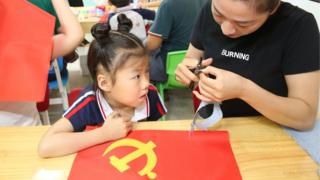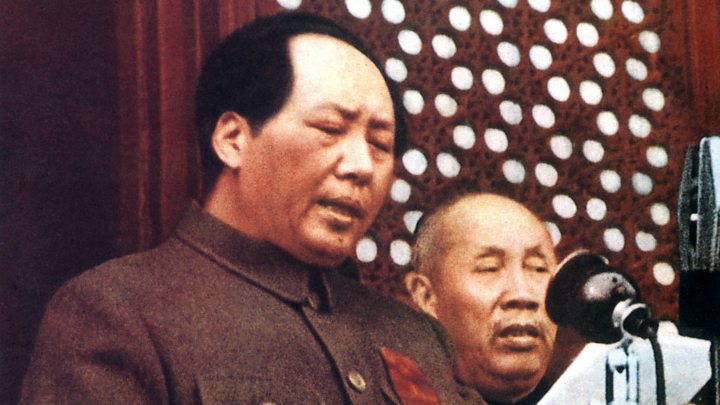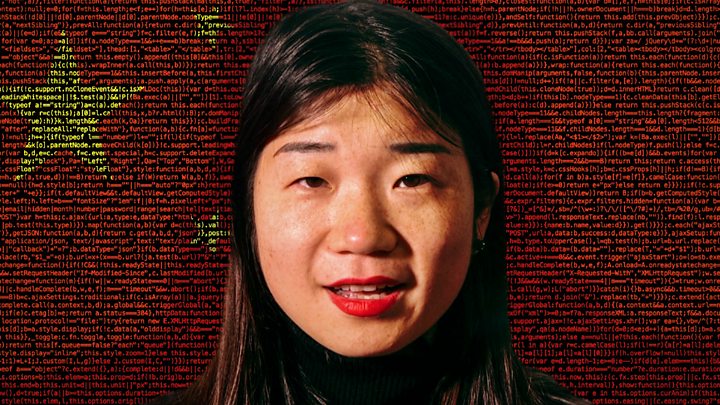How the Communist Party runs China
Since 1 October 1949, China has been run by one party – the Communist Party of China.
The party has led the country from the era of Chairman Mao to become the economic powerhouse is it today, but along the way has tolerated no opposition and quashed dissent.
As the People’s Republic of China celebrates its 70th anniversary, we look at what role the party plays and how it runs China.
If you’re in a hurry, read it in 100 words, if you’ve got time, in 600.
The Communist Party of China is in complete control of the country, from government to police to military.
With some 90 million members, it is organised like a pyramid, with the politburo and eventually President Xi Jinping at the top.
While there is a parliament, the National People’s Congress, it merely rubberstamps the decisions taken by the party leadership.
The party also has a tight grip on the media and the internet to silence dissent.
Love for China is equated with love for the party, while more pluralistic and democratic models of government are dismissed for the sake of national cohesion and growth.
China is effectively a one-party government.
The Communist Party’s leading role is enshrined in the constitution and while there are several other small parties, they are obliged to support the Communists.
Under founder Mao Zedong, the Party enforced rigid totalitarian socialism. Yet the economic failure of the Great Leap Forward and the famine and purges of the Cultural Revolution caused millions of deaths across the country.
After Mao’s death in 1976, the country slowly emerged from stagnation, with the reforms of Deng Xiaoping.
Current President Xi Jinping came to power in 2012 and has since overseen China’s emergence as global super power.
A pyramid controlled from the top
Around 7% of the population are members of the party – loyal membership is essential for anyone who wants to climb the career ladder – whether in politics, business or even entertainment.
That even goes for people like e-commerce giant Alibaba’s Jack Ma, telecomm company Huawei’s founder Ren Zhengfei or celebrities like actress Fan Bingbing.
If they are seen to go against party ideals, they have to publicly apologise to save themselves from secret detention and persecution, which is exactly what happened with actress Fan last year.
Starting from the local level, party organisations elect the higher-up bodies all the way to the leadership. The National Party Congress elects a central committee which in turn elects the politburo.
These elections are usually decided and approved beforehand and the real powers rest with the politburo.
At the very top is President Xi. In 2017, the party cleared the way for him to become president for life.
The party also voted to enshrine his name and ideology in the constitution, elevating him to the level of founder Mao Zedong.
The all-powerful politburo
The Communist Party controls the country from government to police to military.
At the top, the politburo ensures the party line is upheld and controls three other important bodies:
The State Council is the government, headed by the premier – currently Li Keqiang – who is junior in rank to the president.
Its role is the implementation of party policies across the country, for instance managing the national economic plan and the state budget.
The link between military and party dates back to World War Two and the subsequent civil war. The close ties are institutionalised by the Central Military Commission, leading China’s armed forces.
It has control over the country’s nuclear arsenal and its more than 2 million troops, the world’s largest military.
A tight grip on public opinion
The Communist Party does not tolerate dissent. No true opposition parties are permitted and critics of the government risk persecution.
Repression of those who speak out against the authorities shows no signs of abating and a crackdown on human rights has intensified under President Xi.
The crackdowns also don’t spare high-ranking party members. Bo Xilai, once a powerful regional party chief, was found guilty of corruption and abuse of power in 2013 in a show trial and sentenced to life in prison.
China insists it is upholding human rights and justifies its harsh hand on dissent by saying that lifting millions out of poverty trumps individual liberties.
Media and the internet – including social media – are tightly controlled; China’s “Great Firewall” internet censorship controls access to many Western news websites, as well as Google, Facebook, YouTube and Twitter.
The digitalisation of everyday life allows the party to implement advanced surveillance technologies culminating in plans for a social credit system.
This near-total control of media has helped the Party sway public opinion and enforce control.
Source: Read Full Article





